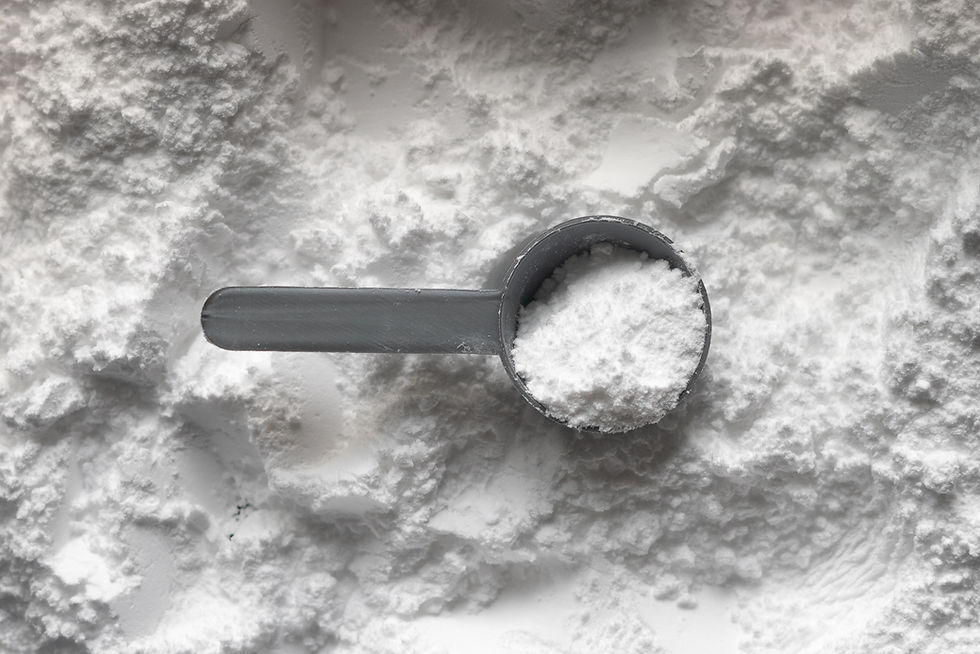Creatine Benefits: Muscle, Brain, Sleep, and Ageing
- Caroline Farrell
- Sep 22, 2025
- 3 min read
Updated: Nov 4, 2025

When most people hear “creatine,” they think of gym-goers or bodybuilders. But growing evidence shows creatine can also be helpful for energy, brain health, and supporting muscle and bone as we age.
What is creatine?
Creatine is a substance our bodies make every day in small amounts, mainly in the liver. We also get it from food, particularly animal sources like red meat, chicken, fish, and parmesan. Plant sources such as soya contain some, but much less. Most of the creatine we store is in our muscles, with smaller but important amounts in the brain.
What are creatine supplements?
Creatine monohydrate is the supplemental form of creatine made for human use. It is most commonly known as a sports supplement used for building muscle. However, there is now extensive evidence to support its use in a wide range of areas:
Brain support: Creatine may help with memory, processing speed, and mental sharpness, especially when we are stressed or sleep deprived
Energy and fatigue: Because creatine boosts cellular energy, some people find it helps them feel less mentally and physically drained
Muscle and strength: From our 40s onwards, we naturally lose muscle each year. Creatine, especially when combined with strength training, helps to preserve lean mass and strength
Bone health: Early research suggests creatine may play a role in supporting bone density
Who might benefit most from creatine?
Creatine can be helpful for a wide range of people:
People who do not consume much meat or fish, such as vegetarians and vegans
Older adults who want to protect muscle mass and support cognitive health
Athletes looking to increase exercise output or muscle mass
People under stress or with poor sleep who may benefit from cognitive support
How to take creatine
Form: Look for creatine monohydrate. It is the best studied, most effective, and most affordable form
Dose: 3 to 5 grams daily works well for most people. You do not need to do a “loading phase” of 20 grams a day for a week unless you want faster results
Timing: You can take it at any time of day. Consistency matters more than timing
With or without food? Creatine is absorbed well on its own, but taking it with a meal, especially one with carbohydrate and protein, may help improve uptake
Side effects: Some people notice mild bloating or stomach upset. If that happens, try splitting the dose across the day or reducing it. If it still bothers you, it may not be the right supplement for you
Quality: Choose a brand that is third-party tested and contains pure creatine monohydrate with no unnecessary fillers
Conclusion
Creatine is not just for those wishing to bulk up. It is safe, affordable, and well studied, with benefits that extend to brain function, energy, muscle, and bone health.
References
Xu, C., Bi, S., Zhang, W., & Luo, L. (2024). Effects of creatine supplementation on cognitive function in adults: a systematic review and meta-analysis. Frontiers in Nutrition, 11:1424972. DOI: 10.3389/fnut.2024.1424972
Gordji-Nejad, A., Matusch, A., Kleedörfer, S., Bauer, A., et al. (2024). Single dose creatine improves cognitive performance and induces changes in cerebral high energy phosphates during sleep deprivation. Scientific Reports, 14:4937. DOI: 10.1038/s41598-024-4937
Smith, A. N., Sullivan, D. K., Morris, J. K., Carbuhn, A. F., Herda, T. J., & Taylor, M. K. (2025). Eight weeks of creatine monohydrate supplementation in Alzheimer’s disease. Alzheimer’s & Dementia: Translational Research & Clinical Interventions. PubMed: 40395689
Kreider, R., et al. (2025). Safety of creatine supplementation: a comprehensive review of randomized controlled trials. Frontiers in Nutrition, 12:1578564. DOI: 10.3389/fnut.2025.1578564
Persky, A. and Rawson, E. (2021). Safety of creatine supplementation. Subcellular Biochemistry, 96, 245–259. DOI: 10.1007/978-3-030-74259-4_12
Candow, D. G., Chilibeck, P. D., Forbes, S. C., et al. (2019). Creatine supplementation during resistance training in older adults: A meta-analysis. Medicine & Science in Sports & Exercise, 51(5), 1047–1056. DOI: 10.1249/MSS.0000000000001912
Kondo, D. G., Sung, Y. H., Hellem, T. L., et al. (2021). Creatine supplementation in major depressive disorder: a double-blind, randomized, placebo-controlled trial. Journal of Clinical Psychiatry, 82(2):20m13624. DOI: 10.4088/JCP.20m13624
Allen, P. J., Dodd, S., & Berk, M. (2022). Creatine as a treatment for depression: A systematic review. Journal of Affective Disorders, 296, 26–34. DOI: 10.1016/j.jad.2021.09.022






Comments